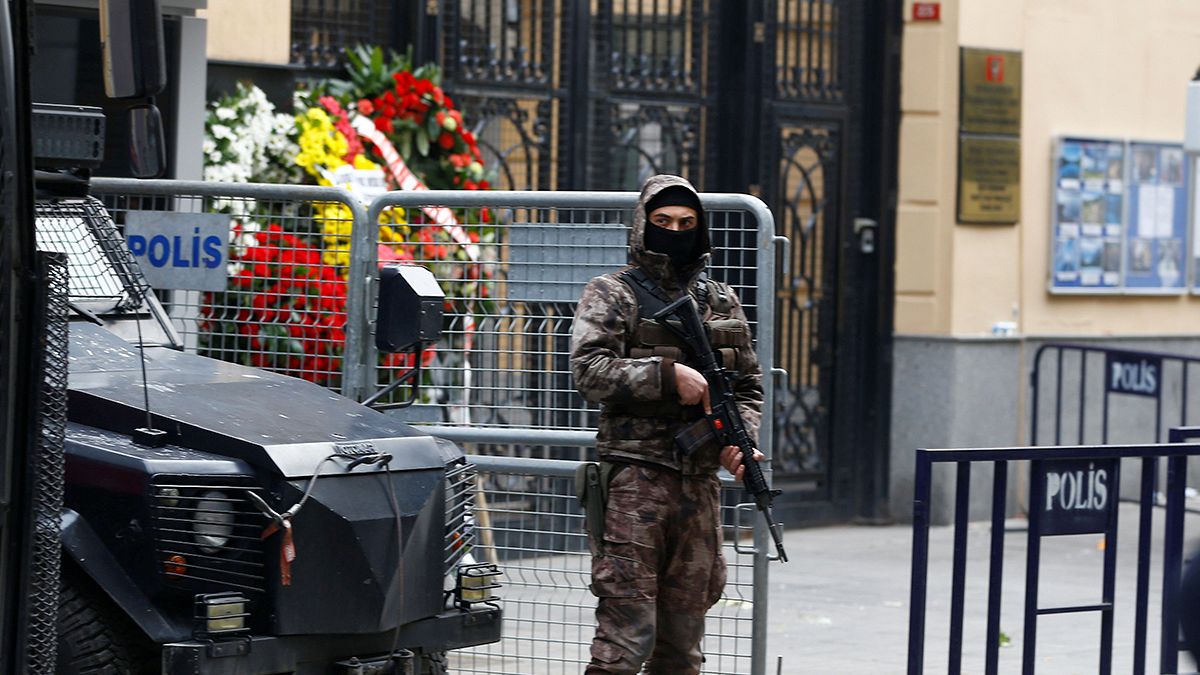Moscow has called Andrei Karlov's assassination 'a blow to Turkey's prestige' and has sent its own investigators to Ankara.
The world has watched the frightening scene over and over again. The young man in the dark suit pacing the stage, finger pointed aloft, gun in hand, his victim lying lifeless on the floor, the cries about revenge for Aleppo.
A political assassination, a murder captured live, a fanatic in action – all this in direct contrast to the almost village-hall ordinariness of the backdrop: pictures hanging on a wall, an art gallery event, a speech about cultural relations.
And right behind the ambassador at the microphone, like a head boy listening to his headmaster’s open day speech, the assassin-to-be clasps his hands.
Despite the presence of such an important guest, there seemed to be not a hint of security in sight. It has been said that people present thought the young man was a security guard.
The moment before: The Russian Ambassador to Turkey looks at a painting at a gallery in Ankara earlier today. Behind him, his assassin… pic.twitter.com/sZyJsTnAYo
— Tunku Varadarajan (@tunkuv) December 19, 2016
Following the assassination of Russian’s ambassador to Turkey, Andrei Karlov on Monday, there has been much focus on the potential impact on Russian-Turkish relations and Syria.
But the Russian team that has joined Turkish investigators in Ankara will be combing over the security arrangements – or lack of them – in the run-up to the murder of their top diplomat.
In the first 24 hours following the murder both countries sang from the same hymn sheet. Moscow and Ankara insisted the killing would not drive them apart.Russian President Vladimir Putin described the killing as a “provocation” designed to derail relations between the two countries which had been on the mend. He spoke on the phone with his Turkish counterpart, whose words echoed his own. Recep Tayyip Erdogan added that cooperation and solidarity in fighting terrorism should become even stronger.
The warm words continued on Tuesday, Russia’s foreign minister saying how grateful his country was to Turkey for its rapid reaction following the ambassador’s assassination.
‘A blow to Turkey’s prestige’
Not so long ago Russia and Turkey were at loggerheads, their differences over Syria threatening to spill over into conflict – especially after Turkey shot down a Russian jet on its Syrian border.
But since then a certain rapprochement has taken place. And with Western powers sidelined, Russia and Turkey banged their heads together to come up with this month’s ceasefire deal enabling the evacuation of civilians in and around Aleppo.
However, two days after Karlov’s murder, the first hints of direct criticism emerged. On Wednesday the Kremlin’s spokesman appeared to call into question Turkish security.
“This (attack), of course, is a blow in the sense of the country’s prestige,” Kremlin spokesman Dmitry Peskov told the MIR television channel, as quoted by Sputnik, referring to Turkey. “Because, as you know, any country bears responsibility for ensuring the security of diplomatic missions and diplomatic representatives on their territory.”
The President paid respects to Russian Ambassador to Turkey Andrei Karlov, killed in a terrorist attack in Ankara https://t.co/mzw5rCjGNPpic.twitter.com/SHFRtv8n5h
— President of Russia (@KremlinRussia_E) December 22, 2016
Turkey itself has been shaken by the security lapse in the diplomatic heart of the capital Ankara, at a time when the country is already reeling from numerous attacks and from a failed coup attempt in July.
Both Turkish and Russian media have reported that the gunman, Mevlut Kert Altintas, had refused to go through security checks at the art gallery where his target was due to speak. The off-duty riot police officer reportedly avoided an X-ray scanner by presenting his police ID to security guards.
An article by Russia Today also questioned Turkish security – although the questions were raised by several American rather than Russian pundits.
“The real question right now … (is) did Turkey do everything they could have and should have done in order to protect ambassador Karlov? Did they slip up in some way?” RT quoted former US diplomat Jim Jatras as saying.
A former Pentagon official went further: “The Turkish national police guard the diplomatic corps in Turkey … there’s going to have to be further vetting and closer attention to who’s guarding who. For this man to have gotten in and get right to the ambassador is astounding,” Michael Maloof said.
The Turkish daily Hurriyet has reported that Karlov’s young assassin had been part of President Erdogan’s own security squad eight times since July’s coup attempt.
‘Russia will want answers’
After the ambassador’s killing, Erdogan and Putin quickly agreed that Russia would help the Turks with the inquiry. A team of 18 Russian investigators duly arrived in Ankara on Tuesday.
“I think that there are people here in Moscow who would say that it is a conspiracy and the Turkish leadership is behind this conspiracy. I think it’s very important that we have a full investigation right now. It’s very important that the Turkish leadership shares information with Russia,” Andrei Kortunov, director general of the Russian International Affairs Council, told BBC radio. The think-tank director knew the murdered ambassador personally.
The questions concerning the murder – and potential differences between Moscow and Ankara – extend beyond the security arrangements. Turkey has been quick to point the finger of blame at the exiled cleric Fethullah Gulen – also held responsible for the failed coup. He has denied being involved in both events.
When questioned about those accusations on Wednesday, the Kremlin’s spokesman said it was too early to draw conclusions.
“We need to wait for the results of the joint investigative group,” Dmitry Peskov said. “It is really not worth rushing to conclusions.”
For now, the rapprochement between Russia and Turkey remains in place. But if – as the investigation into ambassador Karlov’s murder unfolds – divisions emerge, they could exacerbate the strong regional tensions that still lie beneath the surface.
